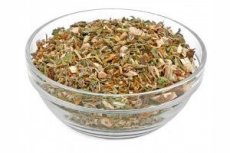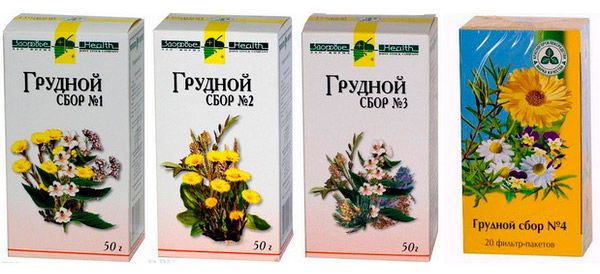Medical expert of the article
New publications
Preparations
Chest Cough
Last reviewed: 23.04.2024

All iLive content is medically reviewed or fact checked to ensure as much factual accuracy as possible.
We have strict sourcing guidelines and only link to reputable media sites, academic research institutions and, whenever possible, medically peer reviewed studies. Note that the numbers in parentheses ([1], [2], etc.) are clickable links to these studies.
If you feel that any of our content is inaccurate, out-of-date, or otherwise questionable, please select it and press Ctrl + Enter.

Diseases of the lower and upper respiratory tract are often treated with a variety of medicinal herbs. To simplify their use, to make it more convenient, a ready-made breast cough for cough was created.
The use of these drugs reduces the intensity of the inflammation that has arisen due to the disease, contributes to the dilution of sputum, its expectoration, and also the process of its excretion makes it easier. In addition, under the influence of the thoracic collection, the bronchi dilate and relax the smooth respiratory musculature - the bronchodilator effect appears.
Does breastfeeding help cough?
Often a cough occurs after hypothermia and is a sign of flu or ARVI. That such cough does not become paroxysmal or chronic, it is necessary to begin treatment in time. This will prevent the transition of inflammation to the lungs and bronchi.
The use of chest cough for cough can reduce irritation of the mucosa. In order for the treatment to be more effective, several charges should be applied at once.
Although breastfeeding is slower than medications, they have an undeniable advantage - unlike pharmaceuticals containing synthetic compounds in their composition, natural herbs will not have a negative effect on the body. Plants that are part of the herbal pouch collection, are divided into several types of effects:
- antitussives (calendula, licorice root, as well as althea root, plantain leaves, mother-stepmother);
- disinfectant (yarrow, sage grass, as well as eucalyptus and mint leaves);
- replenishing the deficit of vitamins (hawthorn and wild rose berries, raspberries with blueberries, as well as black currant).
Indications for use
There are 4 types of chest coughs, the difference between which is the following - they contain different medicinal components. These drugs are intended for the treatment of such diseases:
- Acute, obstructive and chronic bronchitis, as well as bronchial asthma;
- Tracheitis and tracheobronchitis, as well as laryngitis or pharyngitis;
- Chronic obstructive pulmonary disease or pneumonia;
- Tuberculosis;
- Influenza, acute respiratory viral infection, or other diseases in which sputum is evacuated.
 [7]
[7]
Form of issue
Form of release of antitussive piles: packs with herbal collection or tea filter bags.
Herbal pouch collection is a mixture of various herbs that are used to make tincture or a decoction, which helps in cough treatment. Typically, these collections consist of herbs that have antiseptic, expectorant, and mucolytic effects.
All nursing fees from factory manufacturers have numbers, according to the composition and proportions of the herbs. Such a mixture of different types of medicinal plants is placed in a paper bag and then into a cardboard box. Such an herb collection should be stored in a dry container (ceramic or glass). Mix the mixture before use.
Pharmacodynamics
Among the components of the collection are flavonoids, carotenoids, various organic acids, as well as saponins. In addition, it contains tannins, various vitamins and coumarins. This combination of active biocomponents has an effective anti-inflammatory and expectorant effect, soft cough is softened. The collection activates the activity of the ciliated epithelium of the respiratory organs, contributing to the dilution of the sputum and its subsequent expectoration from the bronchi.
Breastfeed from dry cough
If you have an obtrusive dry cough, you can take breastfeeding number 1, because its components have a good anti-inflammatory and bactericidal effect. This allows you to protect the mucous membranes of the respiratory tract, reducing their irritation, so that the desires for coughing will also decrease.
In some cases, with a dry cough it is recommended to apply immediately the 1st and 2nd fees simultaneously - mix both drugs in equal amounts.
Breastfeed from wet cough
If you have a wet cough with expectoration of sputum, you need to accelerate its departure. It is known that the urge to cough is a natural reaction of the body to an irritant. Thanks to the resulting jerky spasms in the bronchi, the mucus in them comes out. To accelerate this process, the chest charges # 2 and # 4 are used.
Tea chest collection
Breast collection in the form of tea is sold in special filter bags, which are similar to tea bags. They are very convenient to brew, because after that they do not need to further filter.
Ingredients of chest cough for cough
The composition of the chest collection from cough # 1 - oregano, pine buds, plantain, sage, as well as the color of black elderberry.
As part of breast collection number 2: licorice root, mother-stepmother, plantain.
Breast collection number 3 contains birch buds, anise, as well as the root of the althaea and elecampane.
The collection number 4 contains chemist's daisy, three-colored violet, calendula, licorice root, peppermint, and also ledum.
Chest fee 1
The main property of this collection is the antiseptic effect. From it prepare medicinal decoctions or tinctures. Apply thoracic collection number 1 should be for the treatment of inflammatory or infectious diseases of the respiratory tract, in which there is a cough.
Breast gathering 2
The licorice root helps to eliminate the inflammatory process, weakening the intensity of cough. In the fight against inflammation is very effective and plantain. Therefore, in combination, these medicinal herbs have a bronchodilating effect - they help to relax the smooth muscles of the bronchi, thereby reducing edema from the mucous membrane.
Breast gathering 3
Breast collection 3 causes the effect of expectoration, and also has an anti-inflammatory effect. Herbs that are part of the medicine, have a significant anti-inflammatory effect, facilitates the process of sputum discharge.
Chest Fever 4
When dry cough is often prescribed chest collection 4, because under the influence of Ledum, the cough from dry turns to wet, and this greatly facilitates the condition of the ill. Inflammation is removed by calendula and violet (it also has a sedative effect).
The properties of breastfeeding are discussed in detail on the example of the drug №4.

 [24]
[24]
Breastfeeding for children from cough
When selecting a breastfeeding cough for children, the age of the child should be taken into account, as well as the presence of concomitant diseases. For babies at the age of one year, they are suitable compositions that contain a minimum of components. At an older age, it is already permitted to use breastfeeding Nos. 3 and 4 (if the child does not have allergies to the components of the drug).
In this case, it should be remembered that in the breast collection No.4 is a rosemary, therefore after taking this medication the patient may have irritability, the appearance of headaches and dizziness. So the use of this collection should be approached cautiously, not exceeding the prescribed dose.
A child who is not yet 1 year old should not be given a breastfeed. It is better to brew one of the plants that are contained in its composition - for example, herb thyme, broth from a licorice root or chamomile.
Children under 3 years of age are prescribed 1 tablespoon. Decoction four times a day. For the age of 3-10 years, the number of spoons increases to 2X, and the number of receptions remains the same.
Children aged 10+ years can take 1/3 of a stack. Three times a day.
Dosing and Administration
Method of use, as well as the recommended dosage of collection number 1. Take 1 tbsp. Mixture, pour 1 stack. Cold water, after which 15 minutes to keep the tincture in a water bath. Next, insist about 45 minutes, then strain and bring the volume of the manufactured tincture to 200 ml. You need to drink it 2-3 r. / Day. 100 ml after eating. For children, the amount of a mixture of medicinal herbs is reduced by half. The treatment course lasts approximately 2-3 weeks.
Breast gathering number 2 is prepared according to the same scheme as the first. Take the medicine you need 3-4 r. / Day. On 100 ml. Tincture should be warm, before taking it you need to shake it. Whole course of treatment also lasts for 2-3 weeks.
Breast gathering number 3 is prepared in the same way, but you need to take not one, but 2 items. Herbal mixture. Dosage and the number of doses are the same as for collection No. 2. The therapeutic course is the same 2-3 weeks.
Gathering number 4 is prepared according to the same scheme, and in the same amount as collection number 3, the treatment course is 2-3 weeks. You need to use tincture for 70 ml 3-4 r. / Day.
Use during pregnancy
Use of breastfeeding during pregnancy is not recommended, because in all these preparations there are components that are contraindicated in pregnancy. In the medicinal collection number 1 there is oregano, in the collections No. 2 and No. 4 - the licorice root, which disrupts the hormonal background, causes tachycardia, increases nervousness, increases the risk of swelling. In addition, because of it may appear headaches. Collection number 3 contains an anise, forbidden during pregnancy.
Contraindications and side effects
Breastfeeding from herbs can be contraindicated if there is an individual hypersensitivity to the components of this medication.
Side-effects mainly occur in patients who have individual hypersensitivity to the drug. Among the effects, there is usually an allergy that manifests itself in the form of urticaria, allergic rhinitis, as well as skin rash, edema or itching.
Overdose and interactions with other drugs
If an overdose occurs, symptoms of intoxication may occur. In the event that thoracic collection No. 4 was used, the poisoning is most likely to be related to the Ledum, since this herb is considered poisonous.
Chest harness is not recommended in combination with antitussive drugs and drugs that reduce sputum discharge - this is due to the fact that as a result, the process of coughing up patients with diluted sputum is difficult.
Storage conditions and shelf life
Breast collection should be kept in a place closed from sunlight. A cooked tincture is allowed to store a maximum of 2 days in a cool place, such as a refrigerator.
Breastfeeding from a cough is allowed to be consumed within 2 years. The expiration date is indicated on the package.
Attention!
To simplify the perception of information, this instruction for use of the drug "Chest Cough" translated and presented in a special form on the basis of the official instructions for medical use of the drug. Before use read the annotation that came directly to medicines.
Description provided for informational purposes and is not a guide to self-healing. The need for this drug, the purpose of the treatment regimen, methods and dose of the drug is determined solely by the attending physician. Self-medication is dangerous for your health.

